Political processes and institutions. Рубрика в журнале - Arctic and North
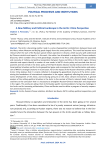
A New Military and Political Landscape in the Arctic: China Perspective
Статья научная
The Arctic is becoming another node in a series of geopolitical contradictions between Russia and the West, where Moscow and Beijing speak largely from the same positions. This trend has become more relevant after the start of the Russian special military operation in Ukraine, which was also well understood by Chinese scientists and experts. In this work, the author has attempted to analyze the Chinese academic discourse, which considers the current geostrategic situation in the Arctic and substantiates the possibility and necessity of military and political cooperation between Russia and China in the Arctic region. Chinese scientists and experts identify a number of new trends in NATO’s Arctic policy and conclude that the adjustment and new trends in the Arctic policy of the North Atlantic Alliance closely interact with the international political situation and the Arctic geopolitical game and correspond to the transformation and expansion of NATO’s strategic functions in recent years. As for the impact of the Russian-Ukrainian conflict on the Arctic, China believes that it is mainly reflected in changing the geopolitical structure of the Arctic; undermining the foundations of international cooperation in the region; negatively affecting the process of economic development of the Arctic; and increasing pressure on the Arctic climate environment. A general analysis of the military-political situation in the Arctic in the context of China’s interests leads Chinese researchers to the conclusion that it is necessary to strengthen Russian-Chinese interaction and cooperation in the region. This conclusion allows them to formulate specific recommendations: facing new challenges in the Arctic and its increasing militarization, China and Russia need to define a program of security cooperation and increase its level.
Бесплатно
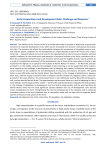
Arctic Corporations and Development Risks: Challenge and Response
Статья научная
The realities of the Russian Arctic in recent decades make it possible to determine a special phenomenon of corporate development risks, which can be structured into resource, institutional and ecosystem risks. The resource risk reflects the contradiction between the conjuncture of the global resource markets and the specific conditions for the development of unique deposits located in the Arctic zone; institutional risk — between federal norms and rules for the development of natural resource deposits and local specific conditions for the construction and operation of resource facilities in the Arctic; ecosystem risk reflects the contradiction between large-scale economic activity and the fragility of Arctic natural systems. As a result of a comparative assessment of the development risks of three Arctic corporations in Russia, it was found that the highest risk is typical for the facilities of Norilsk Nickel, the lowest — for NovaTEK, and Gazpromneft is in the middle. Using the OLI paradigm of John Dunning, it can be argued that Arctic corporations respond to the challenge of development risks by adapting their spatial, institutional and organizational structure to the conditions for the development of resources and resource territories. The spatial factor is most efficiently used by Norilsk Nickel, then NovaTEK, in the strategy of adaptation to development risks, with the receipt of benefits from localization and the creation of a regional cluster, while Gazpromneft is the least effective. The institutional factor is most effectively used by NovaTEK and Gazpromneft, and the least by Norilsk Nickel. The organizational and structural factor as a tool for adapting to risks is most skillfully used by Gazpromneft, weaker — by NovaTEK and Norilsk Nickel. Integrally, the best positions in the strategy of adaptation to development risks are held by Gazpromneft, and the worst positions by Norilsk Nickel, which has the most significant contrast between the size of development risks and the means of adaptation to them. Strengthening the internal competencies of the company and its corporate innovation system is the most important way to successfully cope with the high risks of corporate development of resources and spaces of the Arctic.
Бесплатно
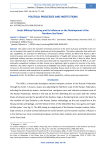
Arctic Military Posturing and Its Influence on the Development of the Northern Sea Route
Статья научная
The author traces the evolution of military presence in the Arctic by Russia and NATO in the article. He analyses the impact of military posturing on Arctic geopolitics. The author advocates that while military capabilities are essential for deterrence, unnecessary military rhetoric by NATO and Russia is detrimental to peace and security in the Arctic. Arctic geopolitics is fraught with tensions due to regular highly publicized military exercises and posturing in the area. The new Arctic Cold War is likely to affect Russia more adversely due to Western sanctions post-2014 and the requirement to develop the NSR as an internationally competitive transport corridor. Russia has a legitimate right to protect its security in the Arctic. However, the author argues it is unnecessary to highlight such events regularly, and it may be more useful to focus on the economy and rationalize military spending. Russia needs to focus on its relationship with the Nordic countries and reemphasize its peaceful and cooperative engagement in the Arctic. Its leadership of the Arctic Council is crucial to reducing tensions in the Arctic.
Бесплатно
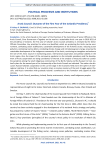
Arctic council: outcome of the first year of the icelandic presidency
Статья научная
In the article based on the report of the Chairman of the Committee of Senior Officials in the Arctic Council, Einar Gunnarsson «Together on the road to a sustainable Arctic: one year in 2019-2021 of the presidency of Iceland», the first year of Iceland’s Arctic Council presidency is reviewed by the Senior Officials Committee. Key priorities for action are identified, which are protecting the Arctic marine environment, combating ocean acidification; sustainable development of the fisheries sector; reducing ocean pollution; combating marine debris; combating climate change and introducing green energy; ensuring the sustainable development of the indigenous community of the Arctic; continuing to strengthen and enhance the role of the Arctic Council in maintaining peace, international cooperation and political stability in the Arctic region. Also, the impact of the coronavirus pandemic on the Icelandic presidency and the development of Arctic cooperation are being considered. Of interest is the analysis of measures taken to counter the pandemic among the small indigenous communities of the North, Siberia and the Russian Far East. Iceland’s plans for the second year of its chairmanship of the Arctic Council are indicated. The author also discusses Russian-Icelandic cooperation at the current stage in the economic field and in the sphere of interregional relations. It is noted that our countries share a common memory of the joint struggle against fascism, and Russia remembers with gratitude Iceland’s contribution to the formation and support of polar convoys.
Бесплатно
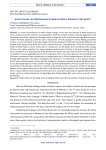
Arctic frontier: Ice Silk Road and its role in China's advance to the Arctic
Статья научная
In recent circumstances of world climate change, Arctic zone has become of great interest for those countries actively involved in its development. With the constant climate warming, deglaciation and increasing of sea-level, commercial transport ways through the Arctic Ocean become a possible economic solution for large exporting countries. Due to importance of north passage for China, Beijing proclaimed itself as a "near-circle State" to get advantages from the development of Northern Sea Route (NSR) that can provide direct access to the Arctic zone and its natural resources. Considering this, China has recently published its White Paper on Arctic Policy, where it announces "Ice Silk Road" to be the official Arctic strategy of China. This article underlines the major intentions and interests of China in its Arctic strategy. One of China's intentions is an enhancement of the Northern Sea Route, that still raises concerns from the specialists whether it can be applicable part of Arctic strategy of China. This article approves that according to Ice Silk Road's connotation Russia should play an indispensable role in China's advancement to the Arctic zone through NSR. Moreover, the author investigates the influence of "Ice Silk Road" on Sino-Russian relations. Both China and Russia appear to prioritize this strategy to ameliorate economic situation and infrastructure in less-developed regions of two countries. Though, economic development of Arctic coastal cities is one of the priorities of the Russian Federation, it remains to be attentive to the involvement of China in the development of the region, mainly out of fear that it will influence its legal position in the Arctic region. Meanwhile, it stays important that two governments come to a consensus concerning the legislative basis of NSR usage and have a deep assessment of advantages and disadvantages that come out as a result of their partnership.
Бесплатно
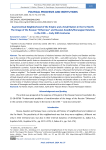
Статья научная
The work examines the features of relations between the Russian Empire and Sweden and Norway in the context of the asymmetric proximity of the 19th - early 20th centuries. The authors have analyzed and identified specific features characteristic of the asymmetrical neighborhood of the empire and a small nation, as well as factors in the formation of ideas about the “Russian threat” to Sweden and Norway during this period and have traced the stages and dynamics of the transformation of these ideas in the Scandinavian countries. Russian-Norwegian and Russian-Swedish relations go back several centuries of asymmetrical proximity, contacts and conflicts, which, of course, influenced the formation of images of the “eastern neighbor”. The Swedes and Norwegians’ fears and expectations, based on perceptions of themselves, about their collective “Self”, contributed to the formation of images of the Russian “Otherness”, the attitude towards which was ambiguous and primarily depended on internal preconditions. Therefore, a detailed study of the transformation of images of Russia in Norway and Sweden allows us to take a new look at the history of relations between these countries, as well as to identify the domestic and foreign policy interests of Norwegian and Swedish societies associated with certain images of Russia.
Бесплатно
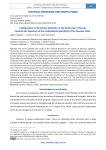
Статья научная
The article publishes the results of the research devoted to the analysis of dominant identities, the position of the population in relation to civic and regional patriotism. Theoretical approaches to analyzing the problem of the relationship between the concepts of “nation” and “patriotism”, as well as the relationship between the configuration of dominant identities and the forms of state formations in the context of this idea are considered. The article presents the results of a questionnaire survey of the population conducted in the spring of 2024 in two regions of Russia — the Republic of Sakha (Yakutia) and the Chukotka Autonomous Okrug. The hierarchy of identities is revealed, the results of the study showed that the Russian identity turned out to be the most significant for the population of both regions. Regional patriotism is more inherent in ethnic groups that have historically inhabited these territories; however, differences were revealed in the regions of the study. In Yakutia, the ethnic identity of respondents of Yakut nationality actualizes the importance of regional rather than ethnic identity, while in Chukotka this tendency is not manifested among Chukchi. The assumption is made that civilizations in the modern world represent a special structure of interaction between the identities of people who are part of it. The specificity of the Russian civilization is that in a multi-ethnic state the ethnic identity, which is institutionalized by the state, is dominant along with the civic identity.
Бесплатно
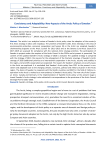
Consistency and Adaptability: New Aspects of the Arctic Policy of Sweden
Статья научная
The article is an analytical review of Sweden’s Arctic policy since the adoption of the country’s first Arctic strategy in 2011 until nowadays. The priorities of Sweden’s 2011 Arctic Strategy in the areas of environmental protection, economic cooperation and human life in the Arctic are analyzed. Sweden’s chairmanship programs at the Arctic Council for 2011–2013 and at the Barents Euro-Arctic Council for 2017–2019 are assessed for compliance with the national Arctic strategy priorities. The participation of Sweden in projects under the auspices of the Arctic Council in the 2010s and at present is presented. The content of the updated Sweden’s Arctic strategy of 2020 is analyzed. The updated strategy is compared with the strategy of 2011; the reasons for the enlargement of the thematic coverage of Sweden’s Arctic strategy of 2020 (additional priorities are international cooperation in the Arctic, security and stability in the region, and scientific cooperation) are explained. The reasons for Sweden’s emphasis on security issues in the Arctic are explained. It is concluded that Sweden’s Arctic policy from 2011 to the present is consistent and adaptable due to the changing climatic, economic, political and military situation in the Arctic region. The desire of Sweden to cooperate with the Nordic countries and NATO in the field of military cooperation in the Arctic is marked as a new tendency in Sweden’s Arctic policy. The new role of the European Union, Canada and Germany in the implementation of Swedish Arctic policy at the present stage is traced. Sweden’s Arctic strategy is also estimated in correspondence to the provisions of the Arctic Council Strategic Plan for 2021–2030.
Бесплатно
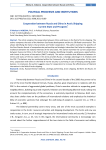
Cooperation between Russia and China in Arctic shipping: current state and prospects
Статья научная
The article analyzes the cooperation between China and Russia in the field of Arctic shipping. The author compares the tasks of the Northern Sea Route development and the Ice Silk Road construction. This allows identifying the factors that promote and hinder cooperation. The author examines the specifics of the Sino-Russian format of comprehensive partnership and strategic interaction that helps to mitigate contradictions between the national interests of the two states. The author examines the current cooperation between Russia and China in the field of Arctic shipping, identifying strengths, weaknesses, opportunities, and threats in key areas of interaction (SWOT analysis). The author concludes that differences between interests and status of the two states in the Arctic provides Russia a strategic advantage in its relations with the PRC. This balance may be maintained within the framework of a multilateral cooperation. At the same time, cooperation with China in the field of marine security is promising in case of keeping existing power balance. In conclusion, the author suggests areas for cooperation to increase the effectiveness of bilateral interaction in the field of Arctic shipping.
Бесплатно
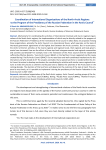
Статья научная
Mechanisms for coordinating the activities of international interstate and macro-regional organizations of the North-Arctic regions, the implementation of which may be directly related to the program of the Russian Federation’s Presidency of the International Arctic Council in 2021-2023, are proposed. Among these organizations, primarily the Arctic Council is an international forum, which operates on the basis of interstate government agreements of the highest level between the Arctic countries. But in recent years, the Arctic territories’ activities at the macro-regional and regional levels, their regional and local governments have increased. How are the efforts of these top-level intergovernmental and regional communities and societies coordinated? For example, how is the interaction of the Arctic Council with the established sufficiently effective Barents / Euro-Arctic Council (BEAC) or the Northern Forum regulated and the newly created Bering / Pacific-Arctic Council (BPAC)? Do we need clear and well-coordinated mechanisms for this interaction and who should do it? The analysis concludes that a special task force is needed within the Arctic Council structure to develop mechanisms for coordinating its activities with similar macro-regional structures to make the process a coherent and focused one to address the priorities of the Arctic basin in the coming decades. The duration of this task force will depend on the outcome of the task at hand. This proposal is very timely, as it is possible to implement it during the presidency of the Russian Federation in the Arctic Council in 2021-2023.
Бесплатно
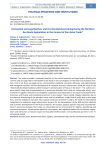
Статья научная
The article provides a systematic analysis of the critical economic and legal factors affecting the current state of cargo flow in the Northern Sea Route in the convergence of the Asian and European markets. First of all, these are legal norms, environmental standards, economic efficiency and organizational and managerial motives, and the development of transport and port infrastructure along the route of the “historically developed national unified transport communication of Russia in the Arctic”. The authors propose specific steps and recommendations to overcome obstacles that create an unfavorable barrier environment for logistics companies to strengthen cooperation and interaction on an equal and mutually beneficial basis with Russia and counterparty partners in the market. These include irregular deliveries due to the seasonal functioning of the transport route and ice conditions, a high level of tariffs due to low cargo flow, and the inability to transport return goods. Particular attention is paid to the need for international cooperation to implement large infrastructure projects for the development of the NSR and the industrial and economic development of the Arctic territories. The authors propose specific steps and recommendations to overcome obstacles that create an unfavorable barrier environment for logistics, stevedoring and insurance companies, infrastructure operators, ship-owners and regulatory authorities to enhance cooperation and interaction on Russia’s equal and mutually beneficial basis and counterparty partners in the international market.
Бесплатно
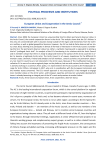
European Union and Cooperation in the Arctic Council
Статья научная
Since 2008, the European Union has unsuccessfully tried to obtain permanent observer status in the Arctic Council, the central cooperation forum in the Arctic. The analysis shows that the EU's failures in this area are connected both with its location mostly outside of the region and remoteness from the northern realities, as well as global geopolitical tensions. However, the EU has had de facto observer ad hoc status since 2013, allowing it to participate in almost all formats of interaction in the Arctic Council. Considering this fact, the permanent observer status has rather a symbolic meaning and is equivalent to joining a kind of “privileged Arctic club”. An analysis of the EU's functioning in its relations with the Arctic Council and its members shows that the EU is ready to adapt and listen to the opinion of the Arctic countries in order to become a legitimate Arctic actor. The Arctic Council is of uneven importance for the different EU member states: Denmark, Finland and Sweden are full members, several countries are permanent observers, but most EU countries are not interested in the Arctic issues. Because of this multifaceted nature, the collective EU is more of an extra-regional player on the platform, but one with serious Arctic claims. The EU is actively working on a common Arctic policy. It is represented in the Arctic Council by the Ambassador-at-Large for Arctic Affairs, introduced in 2017, who acts in coordination with the European Commission and the member states concerned. The EU's overall approach is not unsuccessful: it has managed to engage more member states on the Arctic vector, and European expertise and input on sustainable development issues is already becoming an integral part of the AC's work and promises to evolve further.
Бесплатно
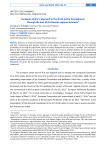
Статья научная
Based on an extensive database, the authors analyzed the main features of the EU Arctic strategy and their relationship with Russian interests in the region. The authors proceed from the fact that the probability of reaching any significant points of contact between the two actors is minimal. The incompatibility of their strategic lines is because the EU considers the Arctic as another platform for its potential of “normative strength”, while Russia, in cooperation with its foreign partners, is primarily aimed at attracting investments in the development of the Arctic infrastructure. In the context of the ongoing crisis in bilateral relations caused by the events in Ukraine, it is not possible to talk about the prospects for harmonizing the regional aspirations of the EU and the Russian Federation.
Бесплатно
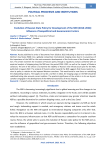
Статья научная
Russia published a series of documents from 2018 to 2022 indicating its desire to transform the Northern Sea Route (NSR) into a globally competitive international shipping route due to its awareness of the importance of the NSR for the socio-economic development of the Arctic zone of the Russian Federation. This article examines the evolution of Russian policy through a regulatory analysis combined with an empirical analysis of shipping along the NSR over the period 2018-2022, as well as the impact of Western sanctions. The aim of the article is to examine the viability of Russia’s new infrastructure plan for the NSR, published in August 2022. The analysis of Russia’s policy towards the NSR suggests that Russia needs to review its policy in relation to the imposed Western sanctions. This would entail a new focus on revitalising the shipbuilding industry. The targets set earlier, and then in 2022, for shipping cargo on the NSR should be redefined taking into account current realities. The practical significance of the article is in its use by policymakers engaged in the development of the NSR and researchers of Arctic shipping.
Бесплатно
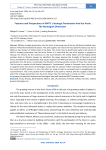
Features and Perspectives of NATO`s Strategic Penetration into the Arctic: The Norwegian Dimension
Статья научная
Military-strategic penetration into the Arctic is becoming one of the key attributes of global capability for influential international players. The point applies not only to the most powerful states, but also to NATO as main keeper of military tools of the West. The article tries to identify and explore the scheme of NATO`s strategic penetration into the Arctic Ocean. It is noted that the role of its support is assigned to Norway, the reasons for the consensus on this issue between the United States and the leading NATO member states in Western Europe are identified. The paper assesses the strengths of Norway’s armed forces and identifies the bottlenecks that require support from NATO partners as they attempt multilateral penetration into the Arctic. Functionally, the Alliance’s anchoring scheme consists of three main elements. The first one is a section of the Russian Federation’s “containment” system in Finnmark. Here, the key role is assigned to the main forces of Norwegian troops with the practice of their operational reinforcement by the troops of NATO partners. In turn, the latter are ready to take an increased load in strengthening the second element. This is the coastline from Trondheim in the south to Tromsø, with the support of bases on which the strategic penetration into the Arctic Ocean (the third element) is carried out. This is ensured by the growing co-operation between the Norwegian Navy and interested NATO member states.
Бесплатно
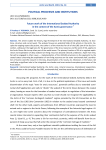
Future work of the International Seabed Authority in the context of the Arctic governance
Статья научная
The article studies the history, legal framework of the International Seabed Authority, its functions, structure and current work. The analysis focuses on potential fields of ISA activity in the Arctic. Despite the ongoing expert discussions, the author is of the view that Part XI of the 1982 Law of the Sea Convention, setting out the legal basis for the governance of the Area resources and the work of ISA, applies to the Arctic Ocean like to any other part of the world ocean. The primary function of ISA is to regulate exploration and exploitation of deep seabed non-living resources beyond national jurisdiction. Apart from that, ISA will be engaged in other issues — implementation of the UNCLOS provisions on the payments by the coastal states concerning the exploitation of non-living resources on the outer continental shelf, coordination of marine scientific research in the Area, dissemination of its results, etc. Moreover, in the future, ISA could play a significant role in the integrated cross-border and cross-sectoral ecosystem governance of the Arctic Ocean.
Бесплатно
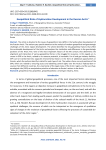
Geopolitical risks of hydrocarbon development in the Russian Arctic
Статья научная
The article is devoted to the issues of geopolitical risks (GPR) in the hydrocarbon development of the Russian Arctic. The authors pay special attention to the analysis of modern geopolitical and geostrategic challenges of the Arctic region development. The article identifies the key geopolitical factors that affect the sustainable development of the Arctic and analyzes the similarities and differences in the geostrategic positions of the Arctic Five. One of the most important factors of the XXI century that determines the alignment and interaction of various geopolitical forces is the struggle for resources. In this regard, an increase in GPR in the Arctic, related to its resource potential, is inevitable. For oil and gas industry facilities, GPR can be transformed into opposite environmental factors in the form of additional opportunities or threats, which the authors identify in detail for each type of risk. The authors focus on such positions of the GPR, which are related to ensuring access and obtaining control rights over the Arctic's hydrocarbon resources from different countries, the uncertainty of the legal status of the Arctic region, and the use of geoecological risks (GER) as manipulative priorities of attention to Russia's actions in the Arctic.
Бесплатно
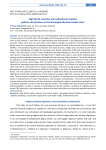
Статья научная
As the world was becoming more interdependent, with increased global awareness of the northernmost parts of the world, both the Norwegian and Russian governments showed more political commitment to and interest in new forms of region-building and development in the High North from 2006 and onwards. Today, more than ten years later, many regional changes are evident in the Norwegian-Russian border zone, as a consequence of expanded people-to-people contacts in the Barents Euro-Arctic Region (BEAR). In this peripheral border area between two national states, villages and cities have become more open, both sociologically and legally for increased cross border cooperation (CBC) and networking. In this article I will take stock of some of these borderland openings following on from the consequence of the two nations’ rising levels of interest in the High North. It explores the ways in which (inter-)national policy-making and state-substate interactions ultimately altered centre-periphery dynamics. This article has based its approach to understanding the interplay of domestic and foreign policy instruments on the ‘substate diplomacy’ literature, which argues that increased state-substate interactions constitute an efficient in-strument for extending cooperation beyond national state borders. The efficiency of regionally driven sub-state interactions is discussed from an empirical perspective. The present study analyses various High North development contexts and discourses (effective from 2008) in the Arctic borderland between Norway and Russia. The new political commitments presented in state-level official documents (the branding of the High North) envisioned a transference of new industrial-economic high tech scenarios from state to local level. These scenarios included new borderland visa regimes, co-existing with cross-border forums invest-ments in improvements of roads, infrastructure, and transport rationalisations. The present article briefly assesses these policy rationales and their outcomes, revealing the region’s contemporary geopolitical and economical potential, as well as local and regional realities. The findings show that substate governments and stakeholders are able to operate in demanding trans-border contexts, contribute to ongoing contem-porary CBC discussions, and complement national and state-level efforts by using their regional expertise to solve problems.
Бесплатно
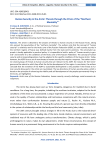
Human Security in the Arctic: Threats through the Prism of the "Northern Mentality"
Статья научная
The article is devoted to the analysis of threats to human security in the Russian Arctic, taking into account the peculiarities of the “northern mentality”. The authors note that the concept of “human security” is relatively new for the Arctic zone of the Russian Federation (AZRF), as until recently security in the northern regions of Russia was defined mainly from the state-centric positions. The universalist approach is hardly applicable in practical policy: it is impossible to build a policy of “human security in general” and transfer it to the conditions of the Arctic zone of the Russian Federation. The concept of human security and corresponding policies must be adapted to the specific conditions of the Russian Arctic. Today, however, the AZRF faces a set of new threats to human security that require a response. The authors examine several groups of threats to human security that are relevant to the AZRF, the reasons for their emergence and the extent to which they affect the further development of the region. In conclusion, the authors conclude that the transition of the AZRF to sustainable development is only possible if the threats to human security discussed in the article are neutralised. The key directions of human security policy, which is based on the principle of enhancing the viability and self-development of the peoples permanently living in the Arctic, are highlighted.
Бесплатно
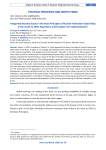
Статья научная
March 5, 2020, President of Russia V.V. Putin approved the Basic Principles of Russian Fedration State Policy in the Arctic to 2035. It is a strategic planning document aimed at ensuring the national security of the Russian Federation and designed to protect Russia's interests in the Arctic. It defines goals, directions, tasks, as well as mechanisms for implementing Russian policy in the Arctic for the next 15 years. The authors analyzed the implementation results of the Basic Principles of Russia's State Policy in the Arctic until 2020 and further perspectives. The article provides a general outline of the Basic Principles of Russian Fedration State Policy in the Arctic to 2035. The authors focus on the analysis of the leading national security challenges in the Arctic and enhancing integrated security of the fuel and energy complex, as well as the main directions of the implementation of the state policy of the Russian Federation in the Arctic. They are the protection of the population and territories of the Arctic zone from natural and human-made emergencies, enhancing national security in the Arctic zone, ensuring the military security of the Russian Federation, and protection of the state border of the Russian Federation. It is emphasized that the comprehensive implementation of the Basic Principles will contribute to improving the quality of life of people in the Arctic zone, socio-economic development of the country, and increasing its defense capability in the Arctic.
Бесплатно

